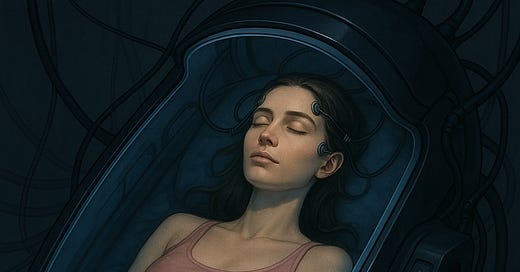Would You Step Into the Bliss Machine?
A few would. But most people know there is no excellence without exertion, no complete satisfaction without striving.
God is day and night, winter and summer, war and peace, satiety and hunger.
—Heraclitus
Imagine a machine, sleek and seductive, promising happiness—the Bliss Machine. Step inside and all suffering vanishes. No pain, no loss, just a continuous stream of euphoria within a narrative of contentment. Your body, sustained indefinitely, floats in a warm, comfortable embrace. But there’s a catch: to enter is to abandon this world entirely. In reality, you’d be a living corpse, tethered to wires, your existence reduced to pulses inducing a lucid dream.
Would you step inside, or would you stay?
I posed this question with all the rigor of a social media poll, but the response was still striking: 95 percent of the 135 respondents said they would refuse to enter the Bliss Machine. Why would anyone cling to a world of suffering if pure bliss were possible? What do we know, in our bones, that resists such a tempting escape?
The answer lies in the Unity of Opposites, whispered by philosophers across time. Happiness and suffering are not enemies, so much as complements in an existential dance.
Heraclitus saw reality as an unstoppable flux, driven by tensions between opposites. For Hegel, history advances through dialectical clashes, where internal contradictions give rise to synthesis and transformation. In Jewish thought, the Yetzer Harah (inclination toward evil) and Yetzer Hatov (inclination toward good) wrestle within us, their dynamic tension shaping our humanity. Daoism’s yinyang teaches that opposites are not to be denied but embraced, as each contains the seed of the other within a harmonious whole.
Being and non-being give birth to each other.
Difficult and easy accomplish each other.
Long and short form each other.
High and low distinguish each other.
Sound and tone harmonize each other.
Before and after follow each other as a sequence.
—Lao Tzu, Tao Te Ching
Without darkness, light means nothing. Without suffering, happiness has no contrast.
There is no pleasure without the sharp edge of pain to define it. Think of water’s cool relief after thirst in the heat, or a lover’s face after time spent apart.
Striving demands effort, which requires exertion despite resistance. Agency is born mainly out of what we pursue or avoid, but our most fulfilling lives require the discipline of saving or the grind of earning what we value. If a father hands unearned wealth to his young son, he breeds ennui—the hollow absence of purpose.
Improvement requires effort, and excellence comes with the sting of failures. Victory is sweet only after defeat threatens. A trophy for everyone is a trinket that confers meaning to no one, while an award earned through toil shines with significance. Mastery means misery. Long nights of practice let repetition etch muscle memory.
Most of us reject the Bliss Machine.
To know happiness, we must know suffering. A life without struggle is a story without stakes, a song without swells or silences. The soul flowers not in sterile comfort but in the messy, shadowed confrontation with life’s dualities. We stay here in reality because we know that to traverse the heights of joy, we must climb steep paths.
In seeking and striving, we find not just happiness but meaning.
One wonders, though….
Are we stepping, day by day, device by device, slowly into the Bliss Machine?





